| Reviews & Columns |
|
Reviews DVD TV on DVD Blu-ray 4K UHD International DVDs In Theaters Reviews by Studio Video Games Features Collector Series DVDs Easter Egg Database Interviews DVD Talk Radio Feature Articles Columns Anime Talk DVD Savant Horror DVDs The M.O.D. Squad Art House HD Talk Silent DVD
|
DVD Talk Forum |
|
|
| Resources |
|
DVD Price Search Customer Service #'s RCE Info Links |
|
Columns
|
|
|
Virginian: The Complete First Season (Limited Edition Embossed Collector's Tin), The
"Came here with almost nothing. Hundred dollars, a Winchester and a wind-broke horse, that's all. I fought Arapahos and Cheyennes. Blizzards. Texas fever. I cleared land and trapped varmints. I built my first house on this spot with two hands and a dull axe. Nearly starved to death for two winters running. Nothing to eat but snowshoe rabbit, chicken mash. Got snakebit. Lived through that, too. I fought it out and I won! I have no choice but to fight back."
"If there's a wrong, you fight it. If you don't, you become a part of it. That ain't so hard to understand, is it?"
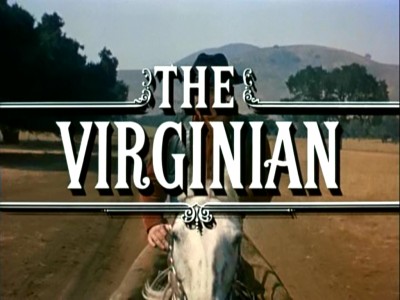
Sensational storytelling from one of television's most iconic Westerns. Timeless Media Group has obtained the rights to release NBC Universal's The Virginian: The Complete First Season (previously released in March in two split-season sets), television's first 90-minute western that premiered back in the fall of 1962. Starring Lee J. Cobb, Doug McClure, Gary Clarke, Roberta Shore and as the title character, James Drury, The Virginian's 30 episodes this first season (do that math at 75 minutes per) maintain a remarkably consistent high quality of scripting and performances...which shouldn't surprise vintage TV Western fans who already know television's finest dramas didn't just come from the more toney New York-based live anthology series. The video transfers look more than acceptable here for Timeless' commemorative tin edition, but there is a problem with the audio recording levels. A bonus disc is included, featuring lengthy interviews with various cast members.
Wyoming. 1897. The "open range" laws are still in effect. That means no fences, no barbed wire, and no squatters unless they have permission from the government. And cattle thieves get strung up for their trouble. On the huge Shiloh Ranch, Judge Henry Garth (Lee J. Cobb, coming off as too modern for the role, frankly) rules with strength and humanity. Having come to Wyoming 20 years before with little more than a rifle and a 100 dollars, the Judge fought loneliness, Indians, sickness, and the myriad other calamities that befell many other pioneers, to eventually carve out a massive cattle empire. His competent ranch foreman, "The Virginian" (James Drury, perfectly cast as the sensitive gunslinger), is a mysterious rover who never reveals his name, and who keeps the lid on the various troubles that can erupt on a frontier ranch (range wars, cattle rustling, rowdy ranch hands) with equal doses of common sense, a fast gun, and an unerring moral sense of right and wrong...even if "fighting the good fight" puts him at odds with his employer and employees. Cattle hands Trampas (energetic Doug McClure) and Steve (Gary Clarke) figure most prominently at the Shiloh Ranch. Trampas is the more light-hearted of these two free spirits, as quick to kiss a pretty girl as pull a gun, while the more serious Steve often battles with his quick-to-erupt temper. Offering high-spirited femininity back at the ranch is the Judge's 15-year-old daughter, Betsy (Roberta Shore), who playfully wonders which of the three men will marry her someday. Occasionally seen around town or at the ranch, newspaper owner Molly Wood (Pippa Scott) provides enigmatic attraction for the nameless "Virginian."
SPOILERS ALERT!
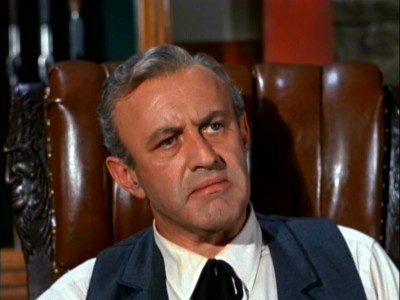
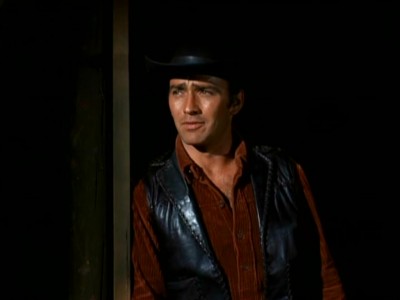
I've written several times before of the experience of "re-discovering" the rather remarkable Western dramas from network television's golden period of the genre during the 1950s and 1960s, so I won't cover that same ground again in this review (please click here to read my Gunsmoke, Rawhide, Bonanza, Wagon Train, and Dick Powell's Zane Grey Theatre reviews). Suffice it to say, when the Western finally went out of fashion on television with the demise in 1975 of perhaps its greatest example, Gunsmoke, many critics and "pop culture historians" of the times - the preponderance of them, as always, coming from left-of-center - gleefully celebrated their death, perceiving them to be, just because of their Western framework, perpetrators of "conservative" (whatever that means in their jargon), traditional values that they the critics deemed outdated for the times. And unfortunately, that's where the genre largely remains today in many new viewers' eyes (if they even know about these old TV Westerns): simplistic shoot 'em-ups, inherently false due to their Hollywood sheen, expressing values that TV viewers simply aren't interested in anymore.
What nonsense. This view, usually born out by critics and writers who haven't actually seen the literally thousands of hours of network Western programming from that period (they usually just parrot back the same tired clichés and bromides they hear from their smug, P.C.-obsessed professors), ignores the fact that the Western genre on television, as first represented by the films of Gene Autry and Roy Rogers and Hopalong Cassidy, and series like The Lone Ranger (wonderful, charming, simple films and shows), had matured by the mid-50s, incorporating many of the topical, serious dramatic themes and storylines that had once been fodder for the successful drama anthologies (many of them live) that dominated early TV ratings in the 1940s and 1950s. And The Virginian is no different. Obviously, the trappings of the Western genre are on display here: guns are drawn and fired, horses are saddled and mounted up, fistfights and barroom donnybrooks are had, and men constantly measure what it means to be a "man" through their actions. But the complex themes and characters explored in The Virginian would be welcome, too (perhaps in modern dress), on the more "respectable" series like Philco TV Playhouse or Playhouse 90 that critics automatically deemed superior. The Western genre on television had, as the popular saying goes, "grown up" with Gunsmoke and The Life and Legend of Wyatt Earp in 1955, so seven years later, it was the norm to have a series like The Virginian view the "old West" as not so much a playground for adolescent fantasies about ropin' and ridin' and shootin', but as an infinitely adaptable framework for serious drama.
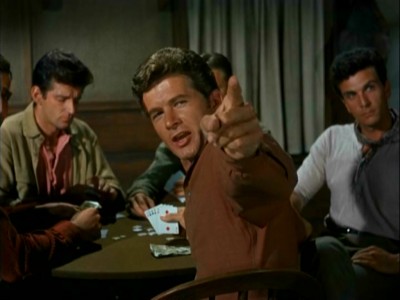
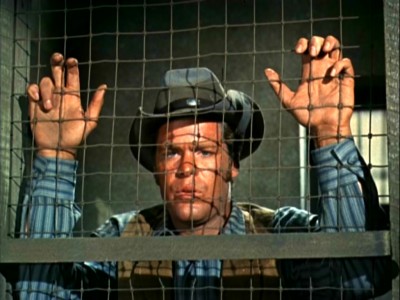
And yet...by 1962, the apex of Western TV popularity had definitely come and gone. In the 1958-1959 season, there were an astounding thirty one Westerns appearing on the network prime time schedules, dropping in number by only one for the following 1959-1960 season. However, by the time The Virginian debuted just three short years later, there were less than half that number in prime time, petering out to single digits by the following season and onward. So The Virginian's more-than-respectable nine season run (with only its 8th season falling out of the Nielsen Top Twenty and Thirty ratings) is a testament to the quality of the writing and performances keeping the show ahead of the pack and aloft in the ratings as the Western genre began its slow ebb into the next decade. Certainly what helped to get The Virginian initially noticed after the viewing public had at that point sifted through several years of relatively similar series, was the fact that, in addition to it being shot in color (still a relative novelty in 1962), it was network television's first 90-minute Western, with NBC promoting it much like a brand new movie-length feature each and every week (in some ways a prototype of the later ABC Movie of the Week). With a production schedule that would kill the cry-baby whiners who now deliver their piddling production orders of 16 or 18 episodes of "art" (as well as abysmal ratings) to the networks today, The Virginian delivered 30 75-minute "mini-movies" during the course of the season, often utilizing 4 or 5 separate production units at a time (with the actors working on as many different episodes at the same time, as well), with rigid production schedules of eight days and no more.
I mention that crushing production schedule for the simple reason that with such a hectic system set in place, one might expect the typical The Virginian episode to resemble not so much a worthwhile drama in and of itself, but a fast-food hamburger, ground out to satisfy issues of expediency, not taste. Not so. Having watched all 30 episodes of this first season these past two weeks, I was again impressed by the consistent quality of the writing and performances that marked the typical "adult" Western drama of 1950s and 1960s network TV (I suppose I shouldn't be so surprised after all these years of watching vintage network TV, but when it's seen in comparison to the absolute dreck that litters the network wasteland today, one can't help but be taken aback at the consummate moviemaking skills on display with a series like The Virginian). I particularly liked how The Virginian just...begins, with no official opening episode that either clearly sets up the overall story arc of the series, or the place of the characters within the environment (although in the first episode, The Executioners, the writers do allow Betsy to define the terms of our cowboy beefcake for easy audience pick-up: Steve is "pretty," Trampas is "funny," and "The Virginian" is the one she wants to marry). There will be plenty of flashback stories in this first season that gives us glimpses into the characters' backgrounds (such as episode 2, Woman From White Wing, where we learn Betsy's true parentage), but for the most part, the adventures on Shiloh ranch are as breezy and happenstance as the lives of the itinerant ranch hands. Regular cast members come and go, not appearing in each and every episode (as sometimes required by the harried production schedule), nicely clipping the temptation to establish another "family" Western where the patriarch looks out and over his surrogate son ranch hands (Cobb disappears in the middle of the season for quite a few episodes before showing up again). And despite the enticement to just "pad" the longer 75-minute episodes, quite the contrary happens: scenes can play out longer, helping to establish and more fully flesh out atmosphere and character, whereas even in a 50-minute Gunsmoke, they'd have to be trimmed back (a good example is the extended barn dance in The Executioners, where Hugh O'Brian - quite sprightly here - gets plenty of screen time to establish his strange character).
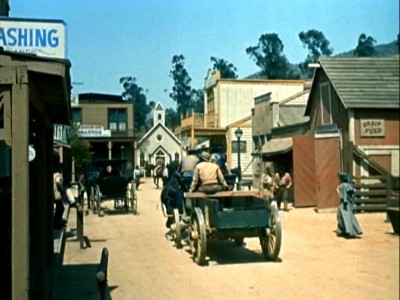
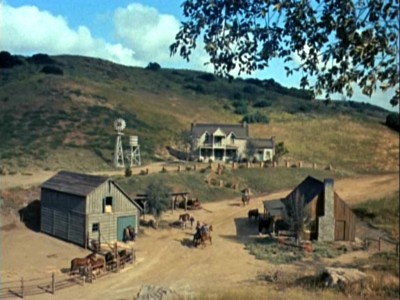
One of the central themes of The Virginian, particularly during the first episodes when Gunsmoke's Charles Marquis Warren executive produced the series, is the constant friction of this transitional period between the old, free, lawless West, and the newly civilized land that rules by the lawbook, not the gun. In the opening episode, the Judge makes it clear that he abhors violence and looks sourly upon any "civilization" that makes a party out of a public hanging. In the simply titled West (one of the best Westerns - on the big or small screen - I've seen from that period), the happy-go-lucky scamp outlaws that roll into town are fugitives from a more "innocent" time in their eyes, in marked contrast to the constrained, tied-down realities of today's Wyoming, with its accountant-like sheriffs and timid, unadventurous townsfolk. In The Devil's Children, a juror on a murder trial counters an old-fashioned juror who wants a hanging, telling him that the days of stringing someone up out of fear, are over; reason and the law must prevail. And in Impasse, hill dweller Eddie Albert can't understand how being first to settle on a mountain now legally owned by the Judge, doesn't entitle him to the wild horses there. It's probably not much of a stretch to include the nervousness of network executives over the issues of screen violence (Congress was holding hearings on it at that time) as a factor with The Virginian's characters' often-stated aversion to gun play or hanging as the answer to all social ills. In the excellent season opener, The Executioners, written by Morton Fine and David Friedkin, "The Virginian" makes a point of saying no death goes unmourned (or avenged), and that even state-sponsored executions have moral consequences for those involved. In the story, a man is hanged for a crime he didn't commit (even though he was a hired gun who had killed many times before), and "The Virginian" admits that he and the town will all "die inside for years" for their part in the hanging. In It Tolls For Thee, a remarkable episode written and directed by Sam Fuller (and you Fuller fans thought you'd seen all his work!) and starring Lee Marvin, the Judge receives accolades from the famous journalist Pulitzer, for being the kind of man who still "lives by the gun" - a label the Judge disavows on principal. Later, the Judge is kidnapped by killer Marvin, and the two engage in a fascinating discussion of the thrill of violence (and the soul-deadening effects of it, as seen by the Judge). As the Judge states, "when a man kills, he kills a little of himself. When a man dies, we all die a little."
Not at all surprising, considering the evolution of the genre, The Virginian in this first season - again more so during the Warren phase of the series, rather than when The Fugitive creator Roy Huggins takes over the executive producing reins - covers relatively complex issues involving the "settling" of the West. The inherent hypocrisy of the Judge's views on violence - held by a man who carved out an empire utilizing it - is tackled head-on in Throw a Long Rope, written by Harold Swanton and directed by Ted Post. A seemingly simple case of cattle rustling turns complex when "The Virginian" sides with the rustler (he doesn't think it's worthy of capital punishment), imploring his employer to "bend with the times," or break, just as the Arapaho Indians had to bend with the arrival of the Judge twenty years before (as "The Virginian" emphatically states, change "is coming. Right or wrong. Black or white, or something inbetween."). Later on in the episode, "The Virginian" lashes out at a martinet former Army officer, calling into question his motives for wanting to round up all the squatters and cattle thieves, with "The Virginian" branding him a "strutting Napoleon after glory," accusing him of orchestrating another Wounded Knee now that there aren't any more Indians to "slaughter" (the episode is fair, though, in showing the Army officer wanting to stop the range war before it starts, with a show of overwhelming force). A good example of the excellent scripting that can be found in almost all of these first season episodes, Throw a Long Rope throws in a clever plot twist of the "innocent" rustler actually being guilty...which causes "The Virginian" to go to an even higher moral ground than from which he usually operates. This resolutely moral compass that rules "The Virginian's" behavior doesn't automatically ensure that he's right 100% of the time. In keeping with the "New Western," "The Virginian" admits it when he's wrong - a big change over old Western kiddie heroes who were never wrong.
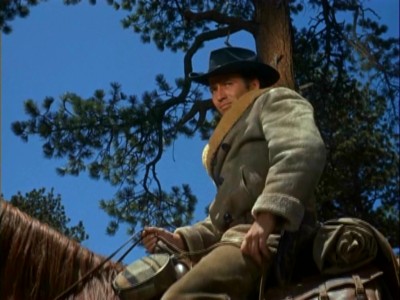
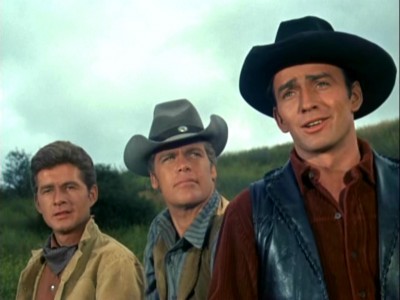
All of this consideration is well-intentioned, of course, and even better executed, but there are times when the series bends too far over backwards to be anti-violent, anti-traditional, anti-heroic (perhaps even anti-"male," if you will) within the context of the genre at that time, a good example being The Brazen Bell, a frankly ridiculous story written by Roland Kibee, that sees a seriously miscast George C. Scott as a weakling teacher who fails to sport any emotion except near-tears when threatened, even when the killers plug his wife due to his cowardice. In the end, believe it or not, he defeats the killers with...poetry (in the same episode, the problematic character Molly, well-played by pretty Pippa Scott, laments from her smug, lofty heights that the common folk who read her newspaper don't want anything but blood in their headlines). But that's the only overt appeal to an extremely liberal take on the genre (and significantly, the season's biggest failure); once Roy Huggins takes over as executive producer, there's a noticeable shift in story themes (lots of mistaken identity and murder trial stories, along with Perry Mason-like mystery plots), and the series lays off a bit on the mordant philosophizing, and increases the fast-paced action. Still, excellent episodes continue in the second half of the season, including the amazing Strangers at Sundown, written by The Executioners' Morton Fine and David Friedkin and directed by Friedkin. When a disparate group of stage coach travelers, including the Judge and Betsy, find themselves under attack by an even-tempered, fair-minded killer, Paul Richards (who's excellent, as is the rest of the cast here), the facades of civility are quickly stripped away as the tribe of survivors begins to turn on the man the killers want - the man hiding amongst them. It's a terrifically tense, exciting episode, equally cerebral in its aims, with Arthur Hunnicutt walking away with the acting honors as a tragically squirrelly former Civil War prisoner who eventually runs and hides, like a child, once the shooting starts (when the wanted man finally begins to confess his sins, Hunnicutt blows out with, "This is gonna be good! Real good! A man stripping his soul nekkid before strangers, all because he's a'feared!" I hit the floor laughing).
The levels of performance here are uniformly excellent, as one would expect for this time period of network programming, when film stars no longer on the "A-lists" and still working off film commitments on their contracts, could find comparatively juicy roles on all those hundreds of hours of TV programming. I mentioned earlier how well Hugh O'Brian came off in the season opener, but I didn't write that Colleen Dewhurst is equally good here as a sexually repressed schoolteacher restricted by society's expectations. In Big Day Great Day, Aldo Ray and Michael Shaughnessy have a ball as a couple of brawling Irish wrestlers. Eddie Albert is sharp and hard as a rustler set in his ways in Impasse, while Lee Marvin is his usual best in the complex Sam Fuller written and directed It Tolls For Thee (watch how much fun Marvin has playing smart and sadistic). I also stated above that I thought the episode West is one of the best Westerns I've seen from the 1960s, from the big or little screen, and a large part of that is due to Steve Cochran. Once he lost the over-ripe, oily handsomeness of his youth, Cochran became a superior character actor (unfortunately, nobody cared at that point), and he's nothing short of remarkable here in a sweet, funny, and ultimately very sad portrayal of a man out of his time. Brandon de Wilde has an excellent showcase in Fifty Days to Moose Jaw, where he strikes up a believable friendship with accomplished pro, James Gregory (this episode has a bit of Mark Rydell's The Cowboys feel to it; it's beautifully constructed - with a surprise ending - by scripters Maxwell Shane and Donald Sanford). Bette Davis, never one to turn down a job, gives a good accounting in The Accomplice, while Tom Tryon turns in a frankly startling comedic/dramatic performance in The Man From the Sea (he's obviously a lot looser away from Preminger), a solid winner that features a creepy performance by Carol Lynley as an insane twin to Shirley Knight. Brian Keith gives a preview of his role in Nevada Smith in Duel at Shiloh, while soon-to-be The Virginian cast member Clu Gulager turns in a nasty performance as a killer in The Judgment. Vera Miles (truly beautiful here in color) gives another underrated performance as a conflicted con artist in The Man Who Couldn't Die, while another criminally underrated actress, the remarkable Nina Foch, conjures up another one of her emotionally scarred characters in Vengeance is the Spur.
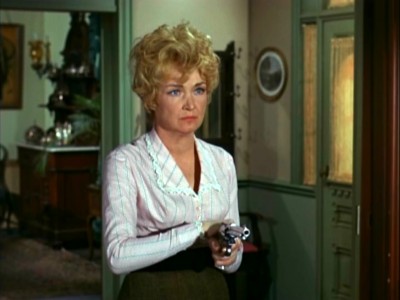
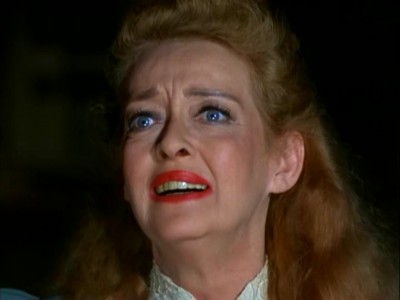
Debuting in September of 1962 on NBC, The Virginian settled into its regular Wednesday night slot of 7:30 to 9:00pm, without variation, for the next nine years. The 7:30 times slot was advantageous not only to accommodate the unusual 90-minute run time (and therefore not end on a half-hour, when viewers might have already jumped ship for an earlier hour-long show), but also to help viewers get a jump on The Virginian's absolutely formidable competition at 8:00pm - the previous year's number one show (for NBC, in the exact same time slot), now ABC's Wagon Train. Apparently, the loss of coverage (ABC just didn't have as many stations as NBC) and the interest in this new 90-minute Western helped The Virginian knock Wagon Train down from the number one show on television to a scary 25th, while also dealing a death blow to CBS's competition, The Many Loves of Dobie Gillis, which had scored high at 22nd the previous year. The Virginian wound up 26th for the year - an entirely respectable showing considering its competition - and would climb to even greater Nielsen heights in the seasons to come.
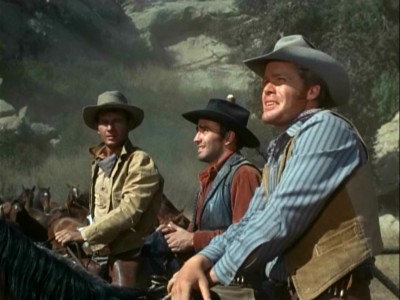
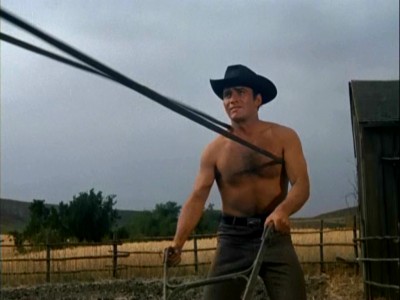
Here are the 33 (!) episodes of the ten-disc tinned set, The Virginian: The Complete First Season, as described on its disc holders:
DISC 1
The Executioners (9/19/62)
The son of a man convicted and hung for a murder travels to Medicine Bow to confront a schoolteacher who may have been with the hanged man the night of the murder in question.
Woman from White Wing (9/26/62)
A stranger arrives in Medicine Bow claiming Betsy Garth as his daughter.
Throw a Long Rope (10/02/62)
An alleged cattle rustler is badly beaten by a posse of local ranchers, and the Virginian comes to his defense.
DISC 2
The Big Deal (10/10/62)
A wealthy Colombian feuds with Judge Garth over the sale of land leased to the Shiloh Ranch by the Colombian's father.
The Brazen Bell (10/17/62)
A schoolteacher and his students are held hostage by two escaped convicts.
Big Day, Great Day (10/24/62)
Judge Garth travels to Casper and catches up with an old friend who is competing in the World Championship of Wrestling. Trampas tries to prevent Steve from marrying a saloon girl.
DISC 3
Riff-Raff 11/07/62)
Trampas, Steve Hill, and The Virginian enlist in the Rough Riders, taking part in the Battle of San Juan Hill in Cuba.
Impasse (11/14/62)
A herd of wild mustangs destined for the US Cavalry becomes the focus of a dispute between the men of Shiloh and Cal Kroeger.
It Tolls For Thee 11/21/62)
Escaped convict Martin Kalig kidnaps Judge Garth.
DISC 4
West 11/28/62)
Trampas and three old saddle-tramp friends try to recapture their days in the Old West.
The Devil's Children 12/05/62)
A barn at the Shiloh Ranch burns down, killing the daughter of Tucker McCallum, and family tensions reach the breaking point.
Fifty Days to Moose Jaw 12/12/62)
A runaway joins his stepfather on a Shiloh cattle drive [author's note: this description on the disc holder is incorrect - the stepfather does not join the cattle drive.
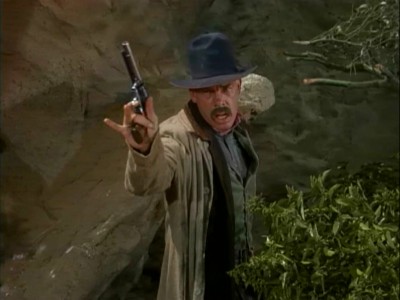
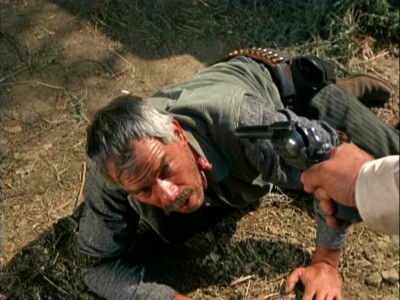
DISC 5
The Accomplice (12/19/62)
Spinster Delia Miller accuses Trampas of a year-old bank robbery.
The Man from the Sea (12/26/62)
A retired sailor returns to Medicine Bow to buy a farm and take a bride.
Duel at Shiloh (1/02/63)
Steve Hill recalls his arrival in Medicine Bow and the events that led to his being hired on at the Shiloh Ranch.
DISC 6
The Exhiles (1/09/63)
The Virginian becomes entangled with a saloon singer while he tries to prove Judge Garth innocent of murder.
The Judgment (1/16/63)
Judge Garth sentences a man to death, and the man's relatives intimidate the people of Medicine Bow.
Say Goodbye to All That (1/25/63)
Trampas grievously injures a man in a shoot-out, and the man's son seeks to avenge his father.
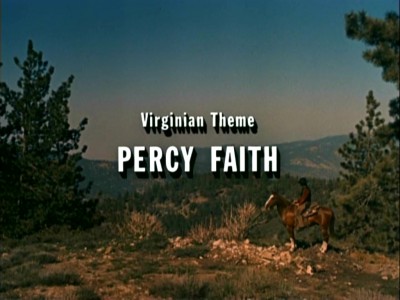
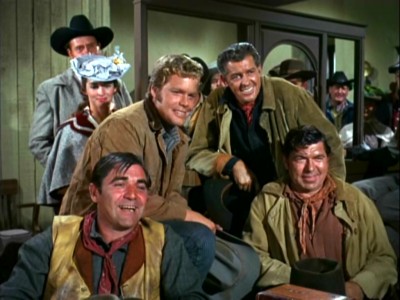
DISC 7
The Man Who Couldn't Die (1/30/63)
Judge Garth takes on a schoolteacher for Betsy, and falls for her, not knowing she is a spy for the railroad.
If You Have Tears (2/13/63)
The Virginian and Trampas seek to help a man wrongly accused of killing his mistress' husband.
The Small Parade (2/20/63)
The men of Shiloh help a group of orphans and a traveling salesman accused of murder.
DISC 8
Vengeance is the Spur (2/27/63)
Venturing into the Wyoming badlands to help a woman find her husband, The Virginian becomes entangled in a web of deceit and greed.
The Money Cage (3/03/63)
A con artist arrives in Medicine Bow and charms the daughter of a local banker.
The Golden Door (3/13/63)
Judge Garth finds himself in a quandary when the man he defended of a murder charge admits that he killed the man.
DISC 9
A Distant Fury (3/20/63)
Steven finds himself accused of murder when the man his testimony put behind bars comes to Medicine Bow to seek revenge.
Echo of Another Day (3/27/63)
An outlaw arrives at Shiloh Ranch, bringing Trampas' past with him in the form of $50,000 in hidden gold.
Strangers at Sundown (4/03/63)
The Judge and Betsy are trapped in at a stage stop in Montana while an outlaw gang tries to free one of the passengers.
DISC 10
The Mountain of the Sun (4/17/63)
Escorting a trio of three missionary women into the Yaqui Indian territory, The Virginian falls in love with one of the women.
Run Away From Home (4/24/63)
The Virginian and Steve agree to transport $40,000 to Medicine Bow after a run on a local bank.
The Final Hour (5/01/63)
Trampas and two others compete for the affections of the daughter of a young Polish girl.
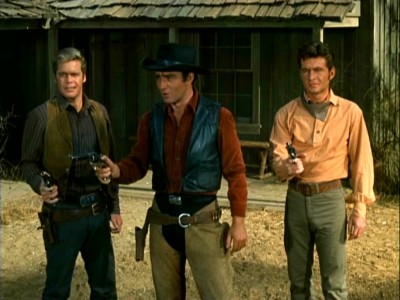
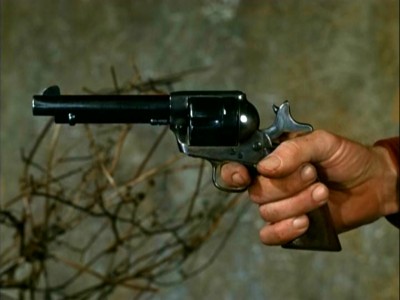
The DVDs:
The Packaging:
For this special edition of the complete first season, a commemorate tin has been struck with the likeness of the cast on front (not bad). Inside, cardboard disc holders (the bane of DVD collectors because they scratch discs, Timeless) are fashioned and bound to look like a little book, where cast photos and episode summaries are included.
The Video:
As far as I can tell (I'm not an expert on the series or individual episodes), all of the episodes of The Virginian: The Complete First Season seem complete at 75-minute (plus or minus a few seconds) run times. The elements used for the full-screen, 1.33 color transfers are fairly clean (only minor scratches and dirt, occasionally), with some minimal fading at times and a sharpish image.
The Audio:
Here's where we have some problems. In several episodes, it's noticeable that the recording levels are wildly fluctuating (almost as if someone woke up at the controls and suddenly turned up the volume). For the majority of the episodes, the recording levels of the Dolby Digital English mono track are entirely too low, with a muddy, sometimes squelchy quality that doesn't help, either. I'm not asking for 5.1, but when that stirring Percy Faith theme music comes on, I want to hear it, cowboy. No close-captions or subtitles, either.
The Extras:
Interviews with The Virginian castmates James Drury (48:27), Roberta Shore (19:40), Gary Clarke (28:17), along with Robert Fuller (1:02) and Peter Brown (7:46), are included here on a separate bonus disc. They have a lot of good information from the well-spoken cast for fans of the show, but I must say from a technical standpoint, they're subpar. Both Drury and Clarke are cut off in midsentence at the end of their interviews (completely unacceptable editing for a DVD bonus), while Brown's interview suffers from a wandering focus problem. Amateur night, quite frankly.
Final Thoughts:
Terrific Western storytelling, with beautifully constructed scripts and top-drawer performances. This special commemorate tin set of The Virginian: The Complete First Season will satisfy Western fans looking for some of that old network magic (back when television was not only competent art, but actually entertaining), while proving to be an eye-opener for newcomers raised on today's mostly incoherent drivel. Calm, charismatic James Drury heads up the equally talented cast here, while the guest stars such as Bette Davis, Lee Marvin, Eddie Albert, Nina Foch, Michael Rennie, Brian Keith, Colleen Dewhurst Robert Duvall, and many others (but not the ridiculously miscast George C. Scott) read like a "who's who" of 1960s performers. Nice bonuses, as well. I highly, highly recommend The Virginian: The Complete First Season.
Paul Mavis is an internationally published film and television historian, a member of the Online Film Critics Society, and the author of The Espionage Filmography.


|
| Popular Reviews |
| Sponsored Links |
|
|
| Sponsored Links |
|
|
| Release List | Reviews | Shop | Newsletter | Forum | DVD Giveaways | Blu-Ray | Advertise |
|
Copyright 2024 DVDTalk.com All Rights Reserved. Legal Info, Privacy Policy, Terms of Use,
Manage Preferences,
Your Privacy Choices | |||||||















